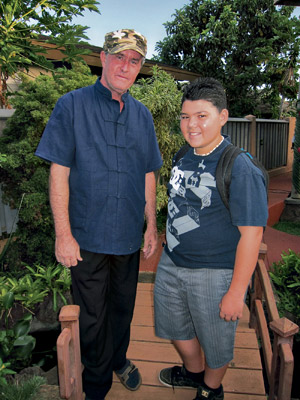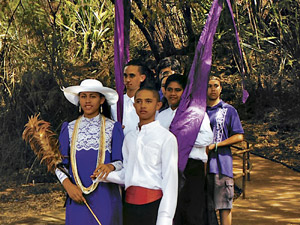Celebrating The Life Of Ka‘iulani
Mark Jeffers’ Storybook Theatre of Hawaii reaches out to Ni’ihau natives for the annual remembrance of Princess Ka’iulani
There is so much to learn from the people of Ni’ihau, says Mark Jeffers.
“They have much more of a community sense,” adds the Storybook Theatre of Hawai’i executive director.
It is that sense of extended family and aloha that Jeffers wanted to celebrate at the annual Princess Ka’iulani Keiki Festival last month.
For the first time, Hanapepe Park metamorphosed into a Ni’ihau village by the Kekaha public charter school, Kula Aupuni Ni’ihau a Kahelelani Aloha. The village showcased the culture of the Forbidden Island with food and activities such as shell lei-making.
“I was very impressed by the Ni’ihau people,” says Jeffers, who produces the Princess Ka’iulani Keiki Festival. “When they come together, they all support each other. They’re all very close and not scattered about. A lot of times when you get groups of people together, they go in every direction, but the Ni’ihau people, when they come together, they stay very tuned in to each other and they support each other.”
Laua’e Kanahele, assistant producer of the festival and vice president of Kula Aupuni Ni’ihau a Kahelelani Aloha, misses living on Ni’ihau.
“But my life is here now on Kaua’i,” says the Hanapepe resident, who still occasionally visits the island by invitation only. She says she was excited to represent the close-knit community lifestyle she is accustomed to at this year’s festival.
Students from Kanahele’s school not only commemorated their culture this year, they also continued to pay annual tribute to Hawaiian monarchy by celebrating Princess Victoria Ka’iulani’s birthday. The event honors the short life of the beloved princess and her role in the island’s history.
“The most rewarding thing for me is to educate the kids and give them the true history of Hawai’i,” says Niihauan Kananiuilei (Bridget) Shintani, who portrayed the princess in her native language.
“The princess is an idol for the younger generation,” says Love Kelley, a Niihauan and volunteer for the festival. “She was a hero to the Hawaiian people during the time of the overthrow of the monarchy.”
After the kapu system was abolished, people truly honored and respected their ali’i.
“They loved their kings and queens – they would come and talk with them and share their mana’o,” he says. “It’s so different from other monarchies.”
The princess was born in 1875 and lived a pampered life on O’ahu. Her father was Scottish and her mother was the sister of King Kalakaua and Queen Lili’uokalani. She played a prominent role in attempting to halt the annexation of Hawai’i by the United States.
Though she was slated to become the next queen, the princess died at the age of 23 and was unable to continue her endeavors to re-establish the Hawaiian monarchy.
“The history needs to be retold, preserved and perpetuated for the next generation to know,” says Kelley.
Kanahele agrees.
“I want to make sure that this will be passed on to my kids at my school,” she says. “In every public school, American history is taught. But what about your own history in the Islands, on the land?”
Kanahele admits she never knew any of Ka’iulani’s history before assisting with the festival.
“We never studied the monarchy,” she says. “I think it’s important for our young students – and especially our Hawaiian kids – to know how important our Hawaiian monarchies are.”
Working with these young students of Ni’ihau in preparation for the festival was a delight for Jeffers.
“The children and youths are very well-mannered and respectful, and accept the adults around them; they care about them and what they are learning,” says Jeffers. “The students act very much in unison when given a task or a challenge.
“I appreciated getting to know them individually and watching them respond to our mission of presenting Ni’ihau culture to other people old and young.”





